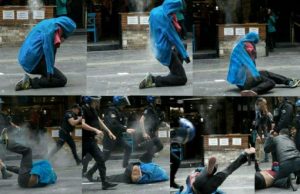Dear Readers,
In the past week we watched a documentary about Japanese UBC Students during 1941 Pearl Harbor Attack in the joint lecture. Watching this documentary made me think how insufficient my knowledge about history is. When we learn about history we learn the dates, causes and the results. But what we don’t learn is witness based history because memories are considered to be subjective. I think that real history is based on these memories that people take the time to remember, talk and write about. In the documentary Mary Shinko Kato breaks into tears when she talks about the night which her father was taken away by the state’s police they are a citizen of. I don’t think that talking about this event was easy for her. When we tried to distinguish between memoir and historical article in class, most of us thought that memories might be altered therefore they might not always be true. Watching this documentary made me feel the opposite way. I thought that our historical knowledge is very limited because we don’t know anything about what happened to minorities at that time. I believe that memories give minorities a chance to talk about their side of history because they were declared as an enemy of the state that time so their pain wasn’t news coverage worthy. Memories are a chance for us to learn about another side of history that has never been told before.
When I ask myself what is the most significant event that has ever happened to me that I could see myself writing a memoir of, I think about the events that has affected my life the most. What affected these Japanese students’ lives the most? A father taken away, people having to leave their homes, students who can’t get the education that they deserve etc. Have we seen any news before this class about them? I didn’t. If memories are considered subjective, who is going to feel the pain that they had to endure at that time? Memories are important because we can’t just know about what the news cover or what we read in a history article if we want to become real global citizens. We need to learn about different sides of an event, read the stories people wrote about their own lives. It is not the same reading about the Iranian Revolution on a history based article and a memoir written by someone who was a child at that time. Everyone has their own fights, their own pain that they had to endure for a long time that nobody has ever heard of before.
I have a sad example about what I think;

This screenshot is from a footage shared on Aleppo Media Center. Everyday we read on the news what happens in Syria, if he had a chance to write a memoir of his life, what would he write about the same event? Would his memories be considered altered if he grows up and decides to write a memoir?
I have a very different example from my own country about this discussion;


This man is Veli Saçılık from Turkey and the photo is by Adem Altan. Veli Sacilik is a sociologist and he was in jail in 2000 because he was in a proletariat protest. Riots happened in jails so the riot police went inside and a lot of prisoners were dead because of this operation. During this operation his arm was torn off by a building crane while he was sitting on his bed. Today, 17 years after that event the government took a lot of civil servants’ jobs away from them and their defense is that these people were enemies of the state. Veli Sacilik is still protesting against the government with his one arm. Media coverage is nearly zero about this purge that is happening. So he uses the popular social media website Twitter to get his voice heard to a lot of people. Are his tweets considered memories? So is Twitter letting people write their memories by creating a new genre? This genre of tweets are 140 characters, you can post some photos with whatever you are writing and you can share what people wrote in less than a second with your own subscribers. Which is pretty neat when I think about how fast a lot of memories are actually getting around. Mr Sacilik uses this genre as a memory device. He tweets about how the crane tore his arm off and also which protests he goes to on a daily basis. He can’t share his memories on a TV show or a newspaper so he uses Twitter to share what happened to him. Him sharing his memories on Twitter instead of an academic article or a news article doesn’t make him an unreliable source in my opinion. Memories are written because the writer’s point of view hasn’t been written before anywhere. Which is what makes memories a special genre to learn from.
When there is no chance for minorities to get their voices heard they only have their memories in their minds. These memories that they later write or talk about are the reality of a situation which we only saw the facts of. People write memories because they had a significant incident which happened to them. Writing memories is not easy and it takes a lot of courage to write memories of traumatizing events. So what we actually learn when we read or listen to memories is how to emphasize with others. Memories are based on what people have been through. We don’t read memories to learn facts, we read memories to feel what people feel in a significant event. I believe that a huge part of being a global citizen is emphasizing with others and memories teach us how to do that.